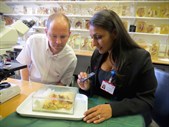 A patient at Royal Brompton Hospital who donated his old heart for research following a transplant has visited the hospital to see how it has been used to help doctors understand more about his congenital heart condition.
A patient at Royal Brompton Hospital who donated his old heart for research following a transplant has visited the hospital to see how it has been used to help doctors understand more about his congenital heart condition.
Seven years after his transplant, Kieran Sandwell asked to visit Royal Brompton to see his old heart and find out how it has been used by experts researching congenital heart disease. Kieran said, “I was amazed at the size of it. Hearts are normally the size of a fist, but it looked like it was two fists. The right ventricle had severely dilated where the muscle wasn’t working.
I thought I’d be quite calm but when they brought it out I froze. It was a very strange experience.
Kieran was born with a form of congenital heart disease called transposition of the great arteries, where the pulmonary artery, which usually takes blood to the lungs and the aorta, which takes blood to the rest of the body, were the wrong way round. This serious heart defect is usually treated surgically in the first days of life and requires lifelong monitoring by cardiologists.
Kieran, who has been a patient at Royal Brompton Hospital for 20 years, had a heart attack at age 13 and a stroke at 21. By the time he was 35, he had developed severe heart failure and the only option to save his life was a transplant, which he finally had in 2009. Before his transplant he told experts that he wanted to donate his heart to Royal Brompton in the hope that using it for research would help others with the life-threatening condition.
When he woke up after surgery, the first thing he did was check that his wishes had been carried out and that Royal Brompton had received his heart. Kieran said, “I had always wanted to donate the heart, and I wanted it to go to Royal Brompton, because I thought it must be of some use to them, even for education.”
The heart was used by Dr Sonya Babu-Narayan, a consultant cardiologist at Royal Brompton, for her research, funded by the British Heart Foundation, investigating whether the risk of sudden heart failure can be predicted in adults born with congenital heart disease. She said, “The research I do is to try and reduce early deaths by improving medical investigations and treatments for abnormal heart rhythms, known as arrhythmias, and when it is best to recommend that more surgery is needed.
“Kieran’s heart has been crucial to the research and has helped to validate some of my findings. We were able to confirm that the MRI he had before his transplant had accurately identified scars in his heart, caused by previous surgery, and damage to his heart as a result of his condition. My research explored whether this scarring can be used to decide if a patient is at risk of serious and life-threatening heart rhythm disturbances and how best to treat them.
“Thanks to Kieran’s help, we are confident that we can use imaging to see and assess the scarring. This kind of imaging will now be added to the care of adult patients with congenital heart disease, so Kieran’s heart has made a real difference to other patients with the condition.”
Kieran added, “Thinking about all the research that has been done, and how that is going to improve the outcomes for patients who are born with heart conditions, is amazing.”
The adult congenital heart disease unit at the Trust is one of the largest specialised centres in the world, caring for patients with a variety of congenital conditions. Overall, the Trust treats around 100,000 congenital heart disease patients a year, with many receiving care from the first days of their lives, through to adulthood.
Experts at the Trust also carry out a significant amount of research into congenital heart defects and are the most prolific in the world in terms of highly-cited papers on the subject. The research programme looks at themes such as the relationship between genetics and congenital heart disease, valve replacements and right ventricle assist devices.
This research is crucial to having a clear understanding of these diseases and contributes to changes in the way patients are treated, leading to significant improvements in outcomes for patients. In the 1950s, only about 20 per cent of babies with a serious congenital heart defect survived their first year, while today around 90 per cent live through to adulthood, many leading relatively normal lives. Research like Dr Babu-Narayan’s means their prognosis continues to improve with every year.
Find out more about congenital heart disease services at the Trust
Find out more about research into congenital heart disease at the Trust
